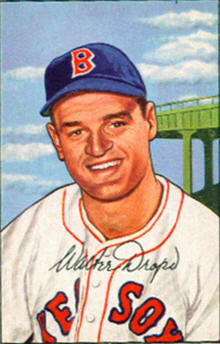A promising baseball, basketball and football player, Dropo’s
college career was interrupted by military service in November
1942. He was stationed at Fort
Devens,Massachusetts,
where he continued to be a star athlete with the Fort DevensReception Center teams.
His teammates at that time included Skippy Roberge of the Boston
Braves, George Yankowski of the Philadelphia Athletics, Bob
Repass of the Washington Senators, Gene Czaplicki (a Cardinals
farmhand), Bill Manning (a Cubs farmhand) and Joe Kwasnieski (a
Red Sox farmhand). He was later stationed in Europe, rebuilding
bridges with the Army Corps of Engineers
in France, Italy and Germany.
Dropo played baseball in Germany after the cease of hostilities
and was honorably discharged in January 1946.
Dropo returned to the University of Connecticut.
When he graduated in 1947 he was the school’s all-time leading
scorer in basketball. Dropo was drafted in the first round of
the 1947
BAA (Basketball Association of America) Draft by
the Providence
Steamrollers. He was also drafted by the Chicago
Bears in
the 9th round of the 1946
NFL Draft.
He turned down both, however, to sign with the Boston Red Sox
and joined the Scranton Red Sox of the Class A Eastern League as
a first baseman in 1947. Dropo batted .297 with 12 home runs his
rookie year and joined the Birmingham Barons of the Class AA
Southern Association in 1948. The 6-foot-5, 220-pound
right-hander hit .357 with the barons and made his major league
debut on Opening Day April 19, 1949 against the Philadelphia
Athletics. He played just 11 games at the big league level that
year before being sent to the Sacramento Senators of the Class AAA
Pacific Coast League.
He was back with the Red Sox in 1950 and was named American
League Rookie of the Year as hit 34 home runs, batted .322 and
drove in a league-leading 144 runs.
Dropo went on to enjoy a 13-year career in the major leagues
although a fractured wrist suffered in 1951 meant he never
returned to the form he showed in his rookie season.
Nevertheless, Dropo played nearly 1,300 games and batted .270.
In June 1952, after being traded to the Detroit Tigers, he
collected 12 consecutive hits to tie a major league record.
After his playing career ended following the 1961 season, Drop
became regional manager of an investment firm, and in 1972 he
went to work for the family business, the Washington Fireworks
Company, in Washington, D.C.
Walt Dropo passed away on December 17, 2010. He was 87.


 Walter Dropo was
born on January 30, 1923 in
Walter Dropo was
born on January 30, 1923 in